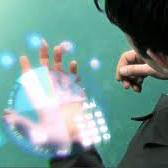Despite growing interest in virtual and augmented reality (VR/AR) for mental well-being, prior work using immersive interventions to teach mental health skills has largely focused on calming or abstract settings. As a result, little is known about how realistic social simulation may better support the transfer and application of skills to in-person environments. In this work, we present a 14-day user study with 43-participants comparing an augmented reality intervention simulating a realistic contextual environment against a matched non-contextual control, applied to the public speaking context. We found that participants who practice mental health skills in the contextual environment showed significantly greater likelihood to apply self-care techniques and greater physiological stress reduction when using skills in mock in-person tasks. Overall, our work provides empirical evidence for the effects of realistic stressor simulation, and offers design implications for mental health technology that supports effective transfer of skills to the real-world.
翻译:暂无翻译



